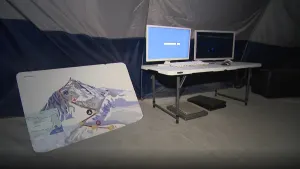More Stories
An innovative breast cancer treatment is showing promise in low-risk tumor patients, and is giving thousands of women an alternative to surgery.
Dr. Kenneth Tomkovich, of CentraState Medical Center, is one of a handful of doctors bringing this cutting-edge treatment to women everywhere.
“This is called cryoablation for breast cancer,” he says.
Cryoablation is less invasive and uses subzero temperatures. It takes the place of surgery. It entails a nick of the skin, a flash of cold and lasts less than an hour. For many women, it may be a cure for breast cancer.
“It uses a probe that uses liquid nitrogen to super freeze the probe. Nothing’s injected in the patients and it creates an ice ball inside the patient that actually kills the tumor,” Tomkovich says.
But it is not appropriate for all women, only those with certain types of less aggressive early-stage cancers.
Tomkovich has performed the procedure 20 times in the last seven years. He claims a full success fate.
Muriel Smith was 79 years old when she became one of the doctor’s first patients after she was diagnosed with a tumor.
“They gave me the option. They told me it’s a new thing that Dr. Tomkovich was doing, which is cryoablation. And then they also told me that I could have surgery. So the choice was real, real easy,” Smith says.
Smith also liked that no chemicals were used and that she was awake during the procedure.
“The tumor froze its way out. So then it was gone and that’s the end of the story. And I could see it shrivel up and go away,” she says. “I had nothing to lose except the tumor, because if it didn’t work, I could always have surgery.”
Cryoablation is approved by the Food & Drug Administration’s institutional review board and is awaiting full FDA approval.
“Right now, we’re charging $5,000 for the procedure,” Tomkovich says.
He says that he anticipates full FDA approval next year and insurance to cover the cost. Both he and Smith say that frequent checkups and yearly mammograms are critical in leading a healthy life.
More from News 12
1:31

What's Cooking: Uncle Giuseppe's Marketplace's prime rib roast
1:30

Looking for a road trip? Check out Big Snow at American Dream in East Rutherford
1:27

What's Cooking: Uncle Giuseppe's quiche lorraine
2:34

Guide: Safety tips to help prevent home burglaries
2:19

Guide: Safety measures to help prevent fires and how to escape one
2:36
